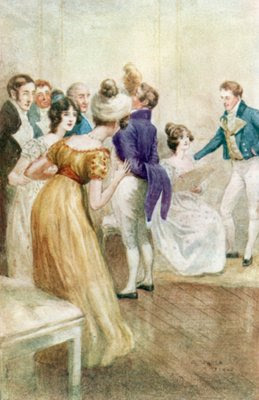Northanger Abbey, chapter 16: Dance Dance Resolution
Well, there is one change, namely that the Tilney family will play a more prominent role starting now. Eleanor and Henry we already know and love. But they’re not going to do much to prepare you for the father and the elder brother (quick, name the brother of an Austen hero with the least impact on the narrative).
First, there’s another meeting with the general. Cat likes him—he’s charming, he showers her with compliments, he’s Henry’s dad—but visiting the Tilneys one day, she can’t help but be exhausted by his niceties (sorry Henry!). Even worse, his kids didn’t speak up much while General Tilney was with them.
Cat expresses her disappointment to Isabella, who immediately calls the entire family snobs. “Of all things in the world inconstancy is my aversion,” she says on hearing that Henry Tilney wasn’t his usual charming self. “Let me entreat you never to think of him again, my dear Catherine[.]” Then she takes an opportunity to put in a good word about her own brother’s “most constant heart.” Cat doesn’t take any of this criticism seriously, because Isabella doesn’t know the Tilneys like Cat does. Good on Cat!
At the ball that evening, however, the other Tilney is waiting in the wings to cause some discomfort. At first, Cat is excited to meet the “fashionable-looking, handsome young man,” but soon “within her hearing, he not only protested against every thought of dancing himself, but even laughed openly at Henry for finding it possible.” Definitely a little Darcy-esque in saying something rude just loud enough for the lady to overhear). But since he’s not as bad as an actual villain, Cat decides to ignore him. After all, Henry’s still dancing with her, so he’s not taking his brother seriously—why should she?
That’s actually a good question to keep in mind about Captain Tilney moving forward.
Since Isabella is engaged, she has declared herself unwilling to dance. And Cat believes her. Thus when Captain Tilney asks Henry to ask Cat if she thinks Isabella wants to dance, Cat replies that Miss Thorpe won’t dance with anyone. Of course, our intrepid heroine is flabbergasted when she sees Isabella standing up with the captain. How can this be?
Henry suggests to Cat that she struggles to “understand the motive of other people’s actions” (he puts it in a more polite way). But both parties insisted on not dancing, she tells him. Maybe Isabella’s will of iron isn’t as strong in a ballroom, which seems natural, he suggests. And “as for my brother, his conduct in the business, I must own, has been no more than I believed him perfectly equal to,” he admits. Henry does not have the additional knowledge, as we do, that Isabella was earlier counting on hanger-on Charles Hodges to “plague” her with dancing requests. Cat does, however, and still doesn’t make the broader connection that Isabella quite obviously wanted to flirt and/or dance that evening.
This will not be the last time these two will discuss the contrary actions of Isabella and Captain Tilney.
When Cat asks Isabella herself why she changed her mind, Isabella is all swoon! Alas! Captain Tilney’s charm offensive was too much for her! “I found there would be no peace if I did not stand up,” she says (after stammering). But don’t worry, she was thinking of James the whole time, and absolutely hated how charming and handsome Captain Tilney was, and how unlike James he is, which is really not a great selling point now that I think about it. And Cat believes her.
Speaking of selling points, the Thorpes receive more news about James’s career prospects: namely, there’s a £400 a year living with his name on it, but he has to wait 2 years until he (and Isabella) can move in. Cat’s all, hey, that’s great, you’ll totally be married to my brother soon! Mrs. Thorpe, in perhaps her most sympathetic moment, picks up on her daughter’s disappointment and tries to reassure her that it’ll be fine. Both mother and daughter insinuate that they hoped Mr. Morland would be able to give more, and Cat reacts to her friend’s bitter attitude. Isabella switches gears and assures Cat that it’s the length of the engagement that frustrates her, not the financial stuff.
And Cat believes her.
The Shapard Shelf: He presents two interpretations here: “Isabella’s brief hesitation may indicate her difficulty in finding a rationalization of her decision to ‘stand up,’ i.e., dance, or it may result from the distraction caused by her memory of the compliments she received.” Shapard points out that £400 a year is “a decent, though not large, income” for the time, and since James will inherit an “estate of at least equal value” on his father’s death, he actually stands to make at least £800 a year. It’s not Bingley money, but it ain’t nothing to sneeze at neither.



Comments
Post a Comment